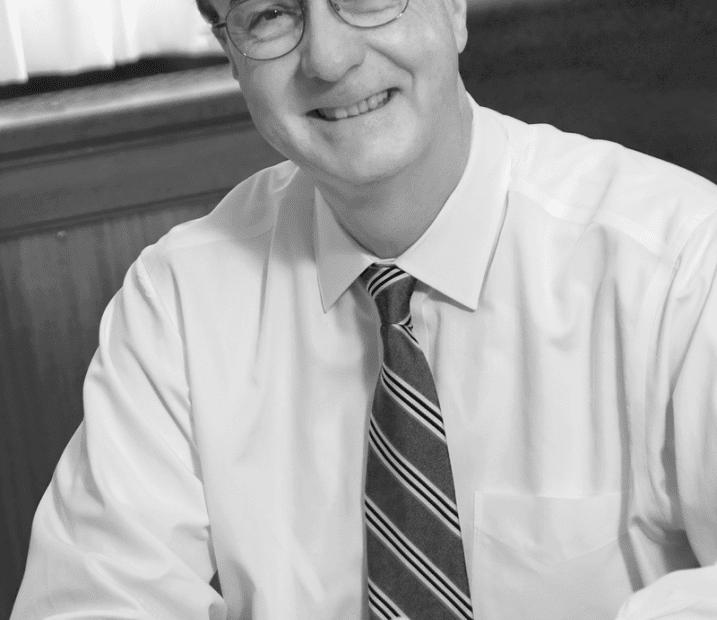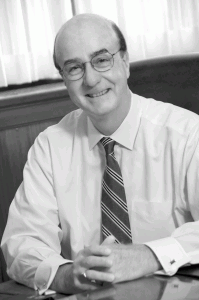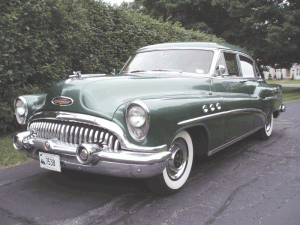
Profiles in Business
He’s a Driving Force in the Business Community
Tom Burton calls it “the Beauty.”That’s the name he gave to a 1953 Buick Super he acquired more than 20 years ago and now displays at several car shows each summer. As he talked about it, Burton said it is most definitely not the kind of vehicle most Baby Boomers — and he’s among the older members of that generation at 65 — set out to put in their garage upon being bitten by the “old-car bug,” as he called it,
“This is not a car you dream of having as a kid; most guys think about the old muscle cars — the Camaros, Mustangs, Firebirds, or Chargers,” said Burton, president and CEO of Hampden Bank, adding that, while he also likes those hugely popular models that now carry big price tags, he never really looked at anything other than that huge, chrome-laden, four-door sedan. Part of the reason was a fairly limited budget for this pursuit, but there was much more to it, as he explained in a recent issue of the bank’s newsletter, which focused on the broad subject of hobbies.
“When I was 7, my father purchased his first brand-new car,” he wrote in a piece titled “The Last Buick.” “Tragically, when I was 10, he died of cancer. Needless to say, my mother was saddled with me and my two younger brothers and that Buick for many years. Without a breadwinner, there was little money to replace the Buick when it became tired and old, and upon turning 16, it was the vehicle I learned to drive.
“By that time, it was totally obsolete, and I was ashamed to take it out on a date,” he continued. “Fortunately, my teenage self-esteem was redeemed when it was replaced by a somewhat used, very uncool, but more presentable Chevy Nova. Although I didn’t appreciate the significance of the Buick at the time, when it came to making a choice on the purchase of a classic car, there was no other.”
It wouldn’t be a stretch to say Burton is a lot like the car that now has its own heated garage and gets regular pampering. Like the 58-year-old sedan, he represents stability, not flash; dependability, not speed — although he says the eight-cylinder Buick still has plenty of giddyup if one is so inclined, although the gas mileage is quite poor. “I don’t know what it is; I just know it isn’t good.”
Yet the bank president and the Super would both earn a good number of style points.
In his 18 years at the helm, Burton has overseen pronounced growth — from $150 million in assets to just under $600 million, and from four offices to 10 — while also orchestrating a change in operational mission, from a bond bank to one that now has a large portfolio of loans, both residential and commercial.
And he’s taken the bank public, a step he considered the best option to attain the capital needed to fuel an expansion plan that has taken the institution well beyond its roots in downtown Springfield.
Looking ahead, he said that Hampden, like all the banks in this region, have to essentially fight their way through this time of general sluggishness in the economy and be positioned for the day when the housing market rebounds and business owners regain the confidence needed to seek capital for expansion and new ventures.
“Loan demand has been very slow; it’s starting to pick up a little bit, but it’s nowhere near where it should be,” he explained. “There’s a hesitancy on the part of business owners to undertake expansions and hire employees, because they’re still uncertain about their future.”
For this, the latest in its Profiles in Business series, BusinessWest talked at length with a business executive who’s been a driving force, figuratively and it seems literally as well, in the region’s business community and, especially, the financial-services sector.
His Big Brake
Burton told BusinessWest that this is actually the second Buick Super he’s owned. The first was in relatively poor condition — “it was a lot junkier” — when he bought it, and he didn’t do much with it.
He found the second in North Carolina after a fairly lengthy search on an Internet that was then still very much in its infancy. After successfully negotiating a price, he had it shipped north. Burton said it doesn’t get out of that heated garage much — it still has only 44,000 miles on it — but he does display it at several area cruise-night gatherings, including a huge show in East Granby that features between 600 and 800 cars. He’s even won a few trophies at such events.
As hobbies go, this one can get fairly expensive — Burton has a plastic model of a 1953 Buick Skylark on the bookshelf in his office, a car that would fetch $125,000 to $150,000 on the open market because so few were made — but not all-consuming … if one keeps things under control, of course. “It can certainly become work if you have too many,” he explained. “At one time I had two cars, and that really became work, and I found that I can have one and thoroughly enjoy that one car instead of doing two or more.”
Besides, he has a number of other things on his plate at the moment, especially leadership of the bank through a period that, while it certainly doesn’t compare with the landscape-changing turmoil of the early ’90s, comes with its own set of more modest but still-intriguing challenges (more on them later).
Burton brings to this assignment an interesting background, one with its foundation in accounting, not banking. Indeed, he spent 23 years at KPMG, and didn’t even count banks among his clientele until he was roughly seven years into his tenure at the then-Big 8 firm’s Springfield office.
His “route,” as he called it, stretched from Hartford into Southern Vermont and New Hampshire, and eventually it included several financial institutions, including what was known then as Hampden Savings Bank.
In 1991, KPMG had a downsizing in its partnership ranks — about 25% of them left or retired. “And that left a lot of pressure on those who remained, including myself,” said Burton. “We went from four partners in our banking group down to two, and that was pretty stressful.”
Elaborating, he said he started to explore other career opportunities, including the opening in the president’s office at Hampden Savings.
“It was a small mutual bank, and I saw it as an attractive lifestyle change,” Burton said of his decision to pursue and eventually take the position after it was offered to him. “I knew banking … I had been working in it through tax and audit work and some consulting for a lot of years, and thought it would be a good opportunity for me.
“We were coming out of a very, very difficult recession at the time,” he continued, noting that banks tapping CPAs as presidents and other top executives was not uncommon during that turbulent period when financial stability was the top priority moving forward. “Prior to that time, the road to becoming a CEO at a bank was through the lending area, and having that lending discipline was important; what they found out was that the lenders didn’t do such a good job, so they said, ‘maybe we need some finance people.’”
The bank he took over didn’t look at all like the one he presides over now, an evolution he says is part of a much broader change that has come to the industry over the past two decades.
“This bank was very different then; it had only 29% of its assets in loans, and subsequently very few loan problems,” he explained, adding that the bulk of the holdings were in bonds. “Six weeks after the annual meeting in February 1994, there was a sharp rise in interest rates that led to the worst bond market since 1927; bonds just collapsed.”
In response, the bank expanded into residential and then commercial lending, with the latter being a pattern repeated at some other community banks, thus dramatically changing the business-lending landscape.
“The local savings banks that traditionally did just mortgages, except for maybe a few consumer loans, all got into business banking,” he explained. “So now, in this marketplace, they dominate the business-banking market — the Uniteds, Chicopees, Westfields, and ourselves are dominating that area.
“The commercial-banking landscape is diminished, and the savings banks have really taken over the commercial-banking realm,” he continued. “We filled a void; we needed to expand, and with the consolidation of the commercial banks, there was an opportunity for the savings banks, who filled that in. And all the commercial lenders we’ve hired, and that others have hired, came from commercial banks, so the players, the individuals, are very much the same people.”
Of General Interest
Hampden also expanded geographically, and boasts five branches in Springfield, (including one in Indian Orchard), two in Longmeadow, and one each in Agawam, West Springfield, and Wilbraham.
Such growth requires capital, however, and in 2006, Burton and the rest of Hampden’s leadership team decided the best course was to take the institution public, a move that mirrored several other area institutions and provided needed flexibility, said Burton.
One of the many aspects of taking a bank public is the resulting change with regard to the dissemination of information, said Burton.
“Transparent” was the word he used to describe how an institution must look and act. Among other things, this means that people like Burton are limited in what they can say and when they can say it.
“You have to let everyone know everything at the same time,” he explained, adding that this has been a learning process for those at the bank. And with that as a backdrop, he talked about the present and future in very general terms and with mostly predictable language.
“Our five-year plan is to simply grow the bank,” he said. “We’ve always done well in this marketplace, especially when there’s been turmoil.”
And by that, he meant mergers and acquisitions, or a further consolidation of the local banking community. Hampden, like most all community banks, fares well when regional institutions doing business in the area become part of much bigger regional or national banks.
As for whether Hampden might become part of such an acquisition, Burton would say only that the bank has been approached on several occasions, but there has been nothing but talk to date.
“We’re a very nice franchise, and we’re attractive to other institutions,” he explained. “We’d be offended if we weren’t invited to lunch every now and then. But our goal is to remain independent.”
Pressed for comments about the current state of the industry and what’s ahead for Hampden and the financial-services industry in general, Burton started by simply recalling a question from someone in the audience at a recent shareholders meeting — and his answer.
“He was asking when the bank was going to increase the dividend,” Burton recalled. “My response was, ‘when I feel comfortable that we can consistently have good quarters.’ My concern was that we’d have some quarters and we may have some that are not so good. The consistency isn’t there just yet.
“Things are starting to look a little better,” he continued, referring to banks’ bottom lines in specific. “Everyone seems to be posting profits — some of them of them are very small, but they are profits — and that should continue. We’re through the worst, things are starting to get better, but we’ve got a ways to go before companies start to feel really comfortable that they can make an expansion or they can hire employees and they won’t have to reverse those decisions.”
While working to help achieve that consistency he spoke of, Burton is keeping busy with many other things. He’s active in the community, with interests ranging from Western New England College (he’s an alumnus), where he has served on the board for many years, including a stint as director, to the Springfield Symphony Orchestra, for which he’s also been a long-term board member. He also plays some golf; he’s a member of Longmeadow Country Club.
He’s also following the professional exploits of his three sons. Tom, the oldest, is an attorney in the Boston area specializing in alternative-energy companies; his middle son, James, is in retail, while his youngest, Sean, is a college music professor.
Which brings Burton to another intriguing subject, a trumpet that dates back to when his father bought the Buick. A Pan American model, the instrument, which has been passed down to several family members, has lost much of its plating, “but still has a lot of character.”
Burton said bank employees have made some several entreaties for him to play it at the jazz festival the bank sponsors each summer, but he has thus far rejected those invitations, and plans to continue that pattern.
“Most definitely not,” he said when asked if there might be an appearance this summer. “I wouldn’t embarrass myself or put people through that.”
And then, there’s the Buick, and the approaching summer, which is its time to shine — in more ways than one.
In the Driver’s Seat
On the day he talked with BusinessWest, Burton was readying for a trip to a Florida, where he and his wife, Kathy, have a condo and spend several weeks a year. He was also planning on bringing the Buick over to Robbie’s Auto Repair on the corner of State Street and Columbus Avenue in Springfield for some work on the master brake cylinder, which had been leaking.
“He [Robbie] takes a great interest in old cars — I think he likes working on them more than he does the modern ones,” said Burton, adding that he brings the Super in at least a few times a year for needed service and replacement parts to keep it running smoothly.
Just like the bank he leads.
George O’Brien can be reached at [email protected]







